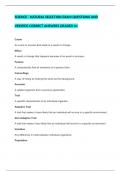-
1. Exam (elaborations) - Natural science final exam study guide questions with complete solutions answered gra...
-
2. Exam (elaborations) - Physical science final exam study guide exam questions and verified correct answers g...
-
3. Exam (elaborations) - Physical science exam questions with complete verified correct answers graded +
-
4. Exam (elaborations) - Physical science exam questions with complete solutions latest update
-
5. Exam (elaborations) - physical science unit 9 waves exam questions with complete solutions correctly answe...
-
6. Exam (elaborations) - physical science exam actual questions with complete solutions verified graded a+
-
7. Exam (elaborations) - 2024 physical science vocabulary exam questions and verified answers graded a+
-
8. Exam (elaborations) - Physical science exam questions and answers with complete solutions graded a+
-
9. Exam (elaborations) - Physical science review exam questions with complete solutions 100% passed
-
10. Exam (elaborations) - Physical science exam questions with complete solutions verified graded a+
-
11. Exam (elaborations) - Physical science - electricity exam questions with complete verified correct solution...
-
12. Exam (elaborations) - Physical science exam questions with complete solutions verified already passed
-
13. Exam (elaborations) - physical science exam questions and updated correct answers verified by expert
-
14. Exam (elaborations) - Physical science review exam questions and correct answers with complete solutions
-
15. Exam (elaborations) - physical science-waves exam questions with complete solutions answered correctly
-
16. Exam (elaborations) - Physical science exam questions with complete solutions answered correctly graded a+
-
17. Exam (elaborations) - Eoc physical science exam questions with complete verified answers 100% guaranteed pa...
-
18. Exam (elaborations) - Physical science exam questions and correct answers graded a+
-
19. Exam (elaborations) - Physical science exam questions with complete solutions verified by expert graded a+
-
20. Exam (elaborations) - Physical science final exam questions with complete solutions verified graded a+
-
21. Exam (elaborations) - Physical science b exam questions and verified correct answers 2024
-
22. Exam (elaborations) - Physical science exam questions and verified correct answers graded a+
-
23. Exam (elaborations) - physical science exam questions with complete solutions verified by expert graded a+
-
24. Exam (elaborations) - Physical science eoc review exam questions with complete solutions verified 2024/2025
-
25. Exam (elaborations) - Physical science test review exam questions with complete correct answers 2024/2025
-
26. Exam (elaborations) - Physical science - spring exam questions and verified correct answers graded a+
-
27. Exam (elaborations) - Glencoe physical science chapter 7 exam questions and answers with complete solutions...
-
28. Exam (elaborations) - Nature of science exam questions with complete solutions verified and graded a+
-
29. Exam (elaborations) - Natural science (psb) exam actual questions with complete solutions graded a+ latest ...
-
30. Exam (elaborations) - Psb natural science exam questions with complete solutions and correct verified answe...
-
31. Exam (elaborations) - (nature) science exam questions with complete solutions updated 2024/2025 already pas...
-
32. Exam (elaborations) - Natural science clep exam questions and verified correct answers graded a+
-
33. Exam (elaborations) - nature of science exam 2024 latest questions and verified answers with complete solu...
-
34. Exam (elaborations) - Science - natural selection exam questions and verified correct answers graded a+
-
35. Exam (elaborations) - Nature of science exam questions with complete solutions with correct answers graded ...
-
36. Exam (elaborations) - Natural science - nutrients exam 2024 questions with complete solutions verified grad...
-
37. Exam (elaborations) - Natural science section 3 exam questions with complete solutions correctly answered 1...
-
38. Exam (elaborations) - Ransom.science.nature of science exam questions with complete solutions verified grad...
-
39. Exam (elaborations) - Nature of science exam questions with complete solutions verified graded a+
-
40. Exam (elaborations) - Psb rn natural sciences exam questions with complete solutions verified. graded a+
-
41. Exam (elaborations) - Natural science (exam 2024 may) questions and verified correct answers graded a+
-
42. Exam (elaborations) - Natural selection & evolution exam review 2024 questions with complete solutions veri...
-
43. Exam (elaborations) - Science fiction final exam 2024 maille exam questions 100% solved correctly and verif...
-
44. Exam (elaborations) - Nature of science study guide exam questions with complete solutions verified. graded...
-
Show more




